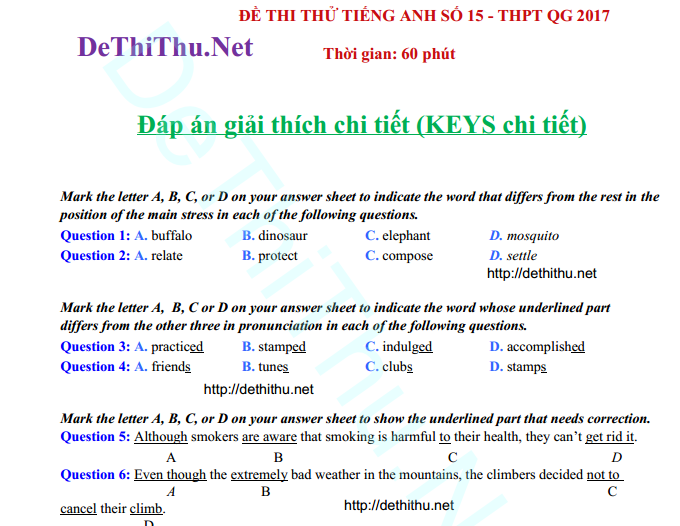Đề thi thử môn Anh 2017 số 15 KEY giải chi tiết cô Phan Điệu gồm 50 câu trắc nghiệm thời gian làm 60p dành cho sĩ tử luyện thi THPT Quốc Gia môn tiếng Anh năm 2017 được ra theo cấu trúc đề thi của Bộ GD. ĐỀ THI THỬ MÔN ANH này được chia sẻ vởi cô Phan Điệu, có đáp án giải thích chi tiết, cụ thể từng câu đi kèm cực kỳ dễ hiểu.
Với dạng tài liệu chất lượng thế này, dethithu.net tin rằng sẽ luôn phù hợp với tất cả đối tượng sĩ tử lớp 12 nói riêng và học sinh nói chung. Có lời giải, sĩ tử có thể biết rõ được các lỗi sai để học lại các kiến thức ngữ pháp còn chưa vững.
Quý thầy cô và các bạn học sinh vui lòng tải file PDF đầy đủ gồm 10 trang ở Link cuối bài viết
Question 9: “Buy me a newspaper on your way back, ______?”
A. will you B. can’t you C. do you D. don’t you
Question 10: My mother told me to ______ for an electrician when her fan was out of order.
A. turn B. rent C. send D. write
Question 11: Lora: “Your new blouse looks gorgeous, Helen!”
Helen: “______.”
A. It’s up to you B. Thanks, I bought it at Macy’s C. I’d rather not D. You can say that again

Đề thi thử môn Anh 2017 số 15 KEY giải chi tiết cô Phan Điệu
Mark the letter A, B, C, or D on your answer sheet to indicate the sentence that is closest in meaning to each of the following questions.
Question 26: “Why don’t you reply to the President’s offer right now?” said Mary to her husband.
A. Mary ordered her husband to reply to the President’s offer right now.
B. Mary suggested that her husband should reply to the President’s offer without delay.
C. Mary told her husband why he didn’t reply to the President’s offer then.
D. Mary wondered why her husband didn’t reply to the President’s offer then.
Question 27: She said, “John, I’ll show you round my city when you’re here.”
A. She organized a trip round her city for John. B. She planned to show John round her city.
C. She made a trip round her city with John. D. She promised to show John round her city.
Question 28: The film didn’t come up to my expectations.
A. The film was as good as I expected. B. I expected the film to end more abruptly.
C. The film fell short of my expectations. D. I expected the film to be more boring.
Question 29: He talked about nothing except the weather.
A. His sole topic of conversation was the weather.
B. He had nothing to say about the weather.
C. He said that he had no interest in the weather.
D. He talked about everything including the weather.
Question 30: It doesn’t matter to them which film they go to.
A. Whatever films are shown, they never see.
B. They don’t care about the cost of the films they see.
C. Which film they go to matters more than the cost.
D. They don’t mind which film they go to.
26B. câu tường thuật dạng đặc biệt ” why don’t you …” đổi thành ” ..suggested that ….”
27D. câu tường thuật và có phần dễ hơn khi từ cụm ” I’ll..” ( tôi sẽ..) đổi thành “she promised …” ( cô ấy hứa…)
29C. He talked about nothing except the weather. ( anh ta không nói về vấn đề nào khác ngoại trừ thời tiết)
- . His sole topic of conversation was the weather.( chủ đề nói chuyện duy nhất của anh ta là thời
tiết) - He had nothing to say about the weather. ( anh ta không có gì để nói về thời tiết)
- He said that he had no interest in the weather.( anh ta nói rằng anh ta không quan tâm đến thời tiết)
- He talked about everything including the weather. ( anh ta nói về mọi thứ bao gồm thời tiết)
30 D. Loại B và C vì nói đến giá cả bộ phim trong khi câu đề không thấy nhắc đến. Câu A cũng loại vì trái nghĩa ( không xem ). Câu D có cụm ” don’t mind” ( không phiền hà gì ) tương tự với cụm
“doesn’t matter” ( không thành vấn đề) nên là đáp án đúng.( họ không cần biết bộ phim mà họ đi xem là phim gì )
Read the following passage and mark the letter A, B, C, or D on your answer sheet to indicate the correct answer to each of the questions from 43 to 50.
Very few people in the modern world obtain their food supply by hunting and gathering in the natural environment surrounding their homes. This method of harvesting from nature’s provision is the oldest known subsistence strategy and has been practised for at least the last two million years. It was, indeed, the only way to obtain food until rudimentary farming and the domestication of wild animals were introduced about 10,000 years ago.
Because hunter-gatherers have fared poorly in comparison with their agricultural cousins, their members have dwindled, and they have been forced to live in marginal environments, such as deserts and arctic wastelands. In higher latitudes, the shorter growing seasons have restricted the availability of plant life. Such conditions have caused a greater dependence on hunting, and on fishing along the coasts and waterways. The abundance of vegetation in the lower latitudes of the tropics, on the other hand, has provided a greater opportunity for gathering a variety of plants. In short, the environmental differences have restricted the diet and have limited possibilities for the development of subsistence societies.
Contemporary hunter-gatherers may help us understand our prehistoric ancestors. We know from the observation of modern hunter-gatherers in both Africa and Alaska that a society based on hunting and gathering must be very mobile. While the entire community camps in a central location, a smaller party harvests the food within a reasonable distance from the camp. When the food in the area has become exhausted, the community moves on to exploit another site. We also notice seasonal migration patterns evolving for most hunter-gatherers, along with a strict division of labor between the sexes. These patterns of behavior may be similar to those practised by mankind during the Paleolithic Period.
Question 43: The word “domestication” in the first paragraph mostly means ______.
A. hatching and raising new species of wild animals in the home
B. adapting animals to suit a new working environment
C. teaching animals to do a particular job or activity in the home
D. making wild animals used to living with and working for humans
Question 44: According to the passage, subsistence societies depend mainly on ______.
A. agricultural products B. hunter-gatherers’ tools
C. nature’s provision D. farming methods
Question 45: In the lower latitudes of the tropics, hunter-gatherers ______.
A. have better food gathering from nature B. can free themselves from hunting
C. harvest shorter seasonal crops D. live along the coasts and waterways for fishing
Question 46: According to the passage, studies of contemporary subsistence societies can provide a ______.
A. further understanding of prehistoric times
B. broader vision of prehistoric natural environments
C. further understanding of modern subsistence societies
D. deeper insight into the dry-land farming
Question 47: The word “conditions” in the second paragraph refers to ______.
A. the environments where it is not favorable for vegetation to grow
B. the situations in which hunter-gatherers hardly find anything to eat
C. the places where plenty of animals and fish can be found
D. the situations in which hunter-gatherers can grow some crops
Question 48: According to the passage, which of the following is NOT mentioned?
A. The number of hunter-gatherers decreases where farming is convenient.
B. Hunting or fishing develops where there are no or short growing seasons.
C. Harvesting from the natural environment had existed long before farming was taken up.
D. The environmental differences produce no effect on subsistence societies.
Question 49: According to the author, most contemporary and prehistoric hunter-gatherers share ______.
A. only the way of duty division B. some restricted daily rules
C. some methods of production D. some patterns of behavior
Question 50: Which of the following would serve as the best title of the passage?
A. Hunter-gatherers: Always on the Move
B. Hunter-gatherers and Subsistence Societies
C. Evolution of Humans’ Farming Methods
D. A Brief History of Subsistence Farming
Quý thầy cô và các bạn hs có thể cập nhật thêm nhiều đề thi thử thpt quốc gia môn tiếng Anh năm 2017 tại chuyên mục

ad ơi, sao mình tải về máy không được 😥 😥 😥 , ad gửi đề vào mail hộ mình được không: thuhang125693@gmail.com
Đề nghị trang web không dùng tài liệu copy. Đây là tài liệu lắp ghép bài của những thầy giáo nổi tiếng đã in thành sách
Chào bạn. Đây là đề thi được cô Phan Điệu chia sẻ trên trang FB cá nhân và chúng tôi sưu tầm đăng tải lên. Không phải do chúng tôi hợp tác ra đề. Nên nếu nhắc đến vấn đề Copy hay là đạo. Xin mời ý kiến tới người ra đề là cô Phan Điệu